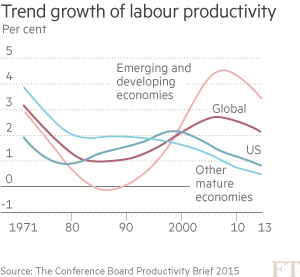The productivity pinch, Netflix non-fiction, a manifesto against meetings

The daily briefing “FirstFT” from the Financial Times.
Feeling unproductive today? You won’t be the only one – it’s a problem all over the world. Worker output grew last year at its slowest rate since the millennium. The slowdown across almost all regions is ringing alarm bells for central bankers from Janet Yellen to Mark Carney.
Average labour productivity growth in mature economies slowed to 0.6 per cent last year from 0.8 per cent in 2013, causing angst for economists who see low productivity as one of the greatest threats to improved living standards.
If you want to boost your productivity, you can still smoke and drink as much as you want – just make sure you sleep at least seven hours a night. Could wearable gadgets help with this? Our employment correspondent is testing out wearable gadgets to see if the data are useful –follow her progress here. (FT, Facebook)
In the news
Suntory spending on vending The food and beverage company will spend about $1.2bn to buy Japan Tobacco’s vending machine business and two of its drinks brands. Suntory, the biggest soft drinks maker after Coca-Cola, has been on an aggressive acquisition spree, completing a $16bn takeover of Beam just last year. It will now operate about 750,000 vending machines – nearly a third of the entire Japanese market. (FT)
Samsung restructures Holding company Cheil Industries will be merged with the original Samsung construction and trading business to create a group with annual revenue of $31bn. Samsung has been tidying up its share structure recently – it is composed of about 70 affiliates in a web of shareholdings. This move will give Lee Jae-yong, the third-generation heir of Samsung’s founder, a 16.5 per cent stake. (WSJ)
Charter near $55bn TWC deal The US cable company backed by billionaire John Malone is nearing a deal to acquire Time Warner Cable in a stock-and-cash deal more than a year after it first eyed the acquisition. (FT)
Apple anoints Ive British designer Sir Jonathan Ive will consolidate his hold on the direction of new products at the world’s most valuable company – he has been promoted to the new role of chief design officer, where he will focus entirely on new projects. (FT)
It’s a big day for
Libor cases Tom Hayes will be the first trader to face prosecution over allegations he was involved in the manipulation of the interbank lending rate used as a benchmark for financial products worth trillions of dollars. The former UBS and Citigroup trader is accused of conspiring with individuals at eight banks and two interdealer brokers over a four-year period. (FT)
Jason Rezaian The Washington Post reporter goes on trial on espionage charges in a hearing that will be closed to the public. Rezaian’s prosecution is viewed as an Iranian bargaining tool in the negotiations over the country’s nuclear programme. (NYT)
UK space industry The UK space and satellite industry will have played a key role in the launch of Ariane Flight VA223 when it lifts off in French Guiana, the latest milestone for an industry whose revenue has grown more than 7 per cent a year since 2010. (FT)
Food for thought
Netflix non-fiction The streaming service wants to change the dynamic of documentaries, which have traditionally targeted niche audiences. It wants to draw bigger audiences to non-fiction, using the same algorithmic secret sauce that helped it garner audiences for series such as House of Cards. (Wired)
Keeping the UK in Europe The case must be hard-headed and cold-blooded, says Janan Ganesh. “In most places, most of the time, democratic politics is the act of selecting the lesser evils … This is doubly true in Britain, with its aversion to ideology.” (FT)
Peak Panama The squeeze on US consumers since the 2007-08 financial crisis is being felt at the Panama Canal. Its chief executive doubts that the waterway will ever top the volume of containers – full of US consumer goods – that passed through the canal pre-crisis. (FT)
Abolish meetings Lisa Pollack dreams of the day she can say no to meetings. Reports show that goal-oriented high-strivers tend to get less out of meetings than low strivers looking for some structure to their day. Unfortunately, the structure of the workplace means you have to turn up for quite a few meetings before you can reach the apex where you can start turning them down. (FT)
Video of the day
Libya’s migrant challenge Borzou Daragahi visits one of Libya’s most overcrowded migrant detention centres, as the country grapples with a flood of African migrants crossing its borders in an effort to reach Europe.(FT)
This article is published in collaboration with The Financial Times. Publication does not imply endorsement of views by the World Economic Forum.
To keep up with the Agenda subscribe to our weekly newsletter.
Author: FirstFT is the Financial Times’ editors curated free daily email of the top global stories from the FT and the best of the rest of the web.
Image: People stand on a platform at a train station in Tokyo. REUTERS/Yuya Shino.
Don't miss any update on this topic
Create a free account and access your personalized content collection with our latest publications and analyses.
License and Republishing
World Economic Forum articles may be republished in accordance with the Creative Commons Attribution-NonCommercial-NoDerivatives 4.0 International Public License, and in accordance with our Terms of Use.
The views expressed in this article are those of the author alone and not the World Economic Forum.
Stay up to date:
Future of Work
Forum Stories newsletter
Bringing you weekly curated insights and analysis on the global issues that matter.
More on Geo-Economics and PoliticsSee all
Isabel Cane and Rob Strayer
November 13, 2025








